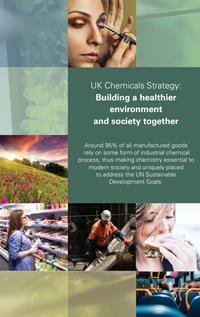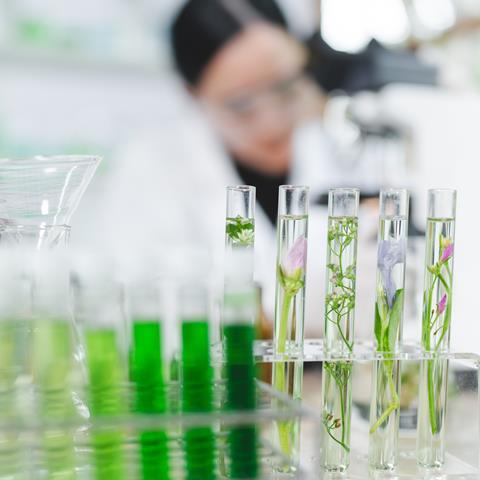Sustainable Growth and Innovation Low Carbon, Circular EconomyResponsibility and Stewardship People and Community
From the moment we get up in the morning to the moment we go to bed, our everyday lives are made safer, healthier and more exciting through the business of chemistry. Fundamental needs such as clean water, sufficient food and effective medicine are all dependent on chemicals, as are our increasingly sophisticated mobile devices, electric vehicles and clean energy sources. This vast range of products and technologies means that around 95% of all manufactured goods rely on some form of industrial chemical process, with the majority of solutions enabled by approximately 6,000 industrial chemicals that account for more than 99% of the total global volume of industrial chemicals in commerce globally today (ICCA-UNEP 2019).
However, with power comes responsibility and it is only right that the chemical industry acknowledges past failings, addresses current concerns and anticipates, as best it can, future challenges. It is that approach – embracing all of society’s combined knowledge – that can help us build a Chemicals Strategy that not only protects people and the environment but also supports a growing economy right across the UK, delivering sustainable jobs and investment and based on clean, sustainable chemistry.
UK chemical businesses are uniquely placed to respond positively to the UN Sustainable Development Goals, with around half a million largely hi-tech, highly skilled and well-rewarded jobs in industry located right across the country, with many in locations that are critical to the Government’s levelling-up agenda. The chemicals sector itself is the country’s largest manufacturing exporter with the wider industry exporting over £55 billion.
Our industry, broader manufacturing, the whole UK economy and the nation itself are facing huge challenges in tackling the health and economic impacts of the COVID-19 pandemic, at the same time as we all prepare to leave the European Union (EU) by the end of 2020. Now, more than ever, we need a Chemicals Strategy that not only connects well with the Government’s approach to sustained economic growth, but one that is applicable across all of the UK, so that chemical companies can compete as effectively as possible around the world for new business and investment. I also believe that the Strategy should have scientific evidence at its core and be multi-faceted, recognising the need for ‘trade-offs’ to help deliver the most sustainable outcomes when addressing the sometimes competing interests of factors such as education, employment and societal wellbeing, innovation, environmental impact, circular economy, energy, regulation and global competitiveness.
CIA’s position sets out our Vision for a UK Chemicals Strategy, based around five building blocks - Consolidate, Balance, Learn, Co-operate and Educate – and complemented by how the Strategy can facilitate CIA’s Vision for Sustainability in the UK Chemical Industry. Implementation of the identified actions under a UK-wide Chemicals Strategy can help:
- PROGRESS Sustainable Growth and Innovation (prosperity, productivity and investment)
- ACCELERATE Low Carbon, Circular Economy (solutions, step change technologies and life cycle thinking)
- STRENGTHEN Responsibility and Stewardship (continuous improvement, workforce wellbeing, preventing harm)
- BUILD People and Community (talent, diversity and engagement).
Vision - The UK’s Chemical Strategy seeks to enable society to enjoy the benefits from chemistry in a safe sustainable way

- The Strategy should be UK-wide to ensure consistency, protection of society and the environment as well as growing the UK economy as a future place for investment in delivering safe sustainable chemicals to meet society needs; addressing in partnership with stakeholders immediate challenges and needs through prioritisation of chemicals presenting high risks for human health and the environment, as well as looking to the medium (2-5 years) and longer term (5+ years).
- The Strategy needs to promote safe use through a risk and science-based policy environment, recognising innovation as playing a central role in meeting the challenges of tomorrow to deliver solutions for a circular and low carbon economy and meet UN Sustainable Development Goals for the UK.
- The right application of the precautionary principle in line with the government’s Regulatory Policy Committee guidance (see back cover for link to document), working in symbiosis with other principles including the innovation principle, is critical for when answers are not available today; additional regulation does not necessarily lead to a better outcome and voluntary approaches should also be considered.
- In the immediate term, it is vital that the Strategy is sensitive to economic recovery challenges and recognises the key resilience role of the chemical industry to society during the COVID-19 pandemic, whilst also supporting industry as the UK goes it alone from the EU e.g. trade negotiations.
Vision for sustainability in UK Chemical Industry
CIA’s Vision ‘Chemistry for a Sustainable Future’ and how the UK Chemicals Strategy can facilitate this is described below
Sustainable Growth and Innovation – Prosperity, productivity and investment
Sector facts:
- At the heart of UK manufacturing our sector is now more widely recognised as an important part of the economic, social and environmental life in the UK whether that be for lifesaving medicines we rely upon, personal protective equipment (PPE), keeping our food and drink fresh or energy saving solutions to much of the technology we take for granted today.
- Approximately 6,000 industrial chemicals account for more than 99% of the total volume of industrial chemicals in commerce globally today [Source: ICCA-UNEP 2019].
CIA and our members strive to meet society’s needs and provide further solutions to deliver growth in the UK. Working with key stakeholders we will strive to:
- maximise our productivity contribution across the whole of the UK and make it the location of choice for growth and investment by rebuilding key supply chains and regional clusters;
- work in partnership with Government – at national and local level – to ensure a resilient, competitive and growing chemical industry at the heart of manufacturing;
- contribute towards the objectives of the 17 United Nations Sustainable Development Goals;
- advocate for a risk and science-based policy environment, including the national Chemicals Strategy, that recognises innovation as playing a central role in meeting the challenges of tomorrow.
To PROGRESS Sustainable Growth and Innovation, the UK Chemicals Strategy should:
- create a positive UK investment climate with incentivisation of innovation for encouraging growth and implementation of polices which enable justified concerns to be addressed in an appropriate manner; and
- implement an innovation test and commitment to the innovation principle for all UK policymaking to enable development of a low carbon, resource efficient economy with innovation contributing towards achieving the UN Sustainable Development Goals for the UK; see ‘Innovation Principle – Why Now?’
Low Carbon, Circular Economy – Solutions, step change technologies and life cycle thinking
Sector facts:
- The chemicals sector adds around £18.3 billion to the UK economy every year accounting for around 10% of the value added by the whole of UK manufacturing.
- The industry helps address the UK’s productivity puzzle, when looking at GVA per employee, the chemical industry’s productivity level is 90% higher than the manufacturing sector and 113% higher than the economy as a whole.
- The chemical industry delivers society savings of 2 tonnes of greenhouse gas for every 1 tonne that we emit in our production processes; with the right policy framework, this could facilitate further emission savings (see ‘The Chemical industry: delivering a low carbon future 24 hours a day’).
CIA and our members fully support the UK government’s commitment to net zero emissions by 2050 and a more circular economy. Working with key stakeholders we will strive to:
- continue advocating for Government to commit and deliver on commitments to fund the commercial scale-up of step change technologies (e.g. hydrogen and CCU/S) that will enable us to continue participating in the low carbon transition at regional and local levels whilst at the same time ensuring our competitiveness and preventing production and carbon leakage;
- increase circular economy thinking in our processes and products through value chain approaches and advocate for regulatory frameworks supportive of industrial symbiosis and chemical recycling;
- drive forward and contribute to decarbonising the economy and increasing circularity in other sectors and the wider economy through climate change and circular solution.
To ACCELERATE Low Carbon, Circular Economy, the UK Chemicals Strategy should:
- support sector deal projects focused on sustainability and decarbonisation, as well as building resilience to the UK economy including identifying priority reshoring opportunities that also help protect standards;
- acknowledge there will be ‘trade-offs’ in delivering a strategy for safe and sustainable chemicals since it will not always be possible to address all challenges at the same time i.e. improve air quality, reduce energy consumption, manage resource efficiency, as well as other sustainability elements including societal and economic aspects;
- recognise and promote the need for clean energy to be widely available at internationally competitive prices;
- establish and build on existing working arrangements with EU and international bodies to inform the Strategy;
- encourage circular economy thinking from design & production to disposal & recycling, with legislation considering both direct & indirect impacts as well as being open to new innovative recycling solutions;
- implement ‘Responsible Care’ for chemicals, or equivalent, throughout their life cycle as a key aspect of the Strategy to help avoid future legacy issues; an example being CIA’s initiative – see publications ‘Product Stewardship Guidance’ and ‘Product Stewardship Check Up Tool’.
Responsibility and Stewardship – Continuous improvement, workforce wellbeing and preventing harm
Sector facts:
- The chemicals sector is the country’s largest manufacturing exporter with the wider industry exporting over £55 billion.
- Using the most recent data available from the EU, US, Canada, Japan and China, there are an estimated 40,000 to 60,000 industrial chemicals in commerce globally [Source: ICCA-UNEP 2019].
CIA and are members are committed to improving health, safety and the environment. Working with key stakeholders we will strive to:
- continue with the substantial progress made through CIA’s Responsible Care Programme and our commitment to sustainability by continuous improvement in health, safety, security and environmental performance;
- champion wellbeing and physical and mental health as priorities;
- promote the safe use of our products such as through continued development and implementation initiatives including CIA’s Product Stewardship Principles;
- advocate for and track the use of the Responsible Care Self-Assessment webtool which automatically links RC maturity with contributions to relevant SDGs; and
- address the broader development of the Responsible Care and Sustainability relationship as it matures through International Council of Chemical Associations (ICCA) policy.
To STRENGTHEN Responsibility and Stewardship, the UK Chemicals Strategy should:
- deliver a joined-up UK chemicals regime that looks to optimise rather than duplicate existing compliance efforts;
- enable UK Regulation to support recovery from COVID-19 impacts in a safe sustainable way;
- improve the integration of science in policymaking, ensuring a holistic approach is being adopted when considering UK legislation concerning exposure to chemicals and its direct and indirect impacts;
- establish a transparent open process to inform future chemical policy decisions on the state of this science, using both existing government advisory committees and new ways of working such as forming ad-hoc specialist groups of experts for specific topics to ensure the best scientific input possible is obtained;
- strive to achieve impartial evidence-based regulatory policy that is informed by thorough scientific assessments focusing on adverse effects, looking at both risks and benefits, with knowledge gaps filled with robust science – a good basis is the government Hazardous Substances Advisory Committee’s publication ‘Considering evidence: The approach taken by the Hazardous Substances Advisory Committee in the UK’;
- use high-quality data in managing chemicals as this allows due weight to be given to primary sources of evidence, rather than focusing on literature reviews, in determining advice and policy decisions;
- consider reviewing and aligning (sectoral) legislation to increase efficiency for both industry and authorities.
People and Community – Talent, diversity and engagement
Sector facts:
- The sector provides half a million jobs, accounting for both direct and indirect employees. Those working directly in the industry have an average weekly pay 30% higher than rest of manufacturing and 50% higher than the wider economy.
- Outside of London, regional productivity in the chemical industry is between 1.2 and 4.5 times greater than the economy as a whole. These differences are most notable in the poorest performing regions of the UK such as Wales and the Northeast where productivity in the chemical industry is 2.8 and 3.0 times higher than the working economy.
CIA and our members seek to better reflect the diversity of society throughout our workforce. Working with key stakeholders we will strive to:
- proactively champion the promotion of policies and training programmes targeted at delivering diversity at all levels of our workforce;
- attract and retain the talent and skills that are crucial to the success of our industry;
- engage with early careerists through CIA’s Future Forum and with local communities;
- using this vision as a platform for engagement, explore with stakeholders and the supply chain further opportunities to collaborate and partner.
To BUILD People and Community, the UK Chemicals Strategy should:
- educate and raise awareness at all levels of society on the importance of chemicals to society and the need for sustainable management, balancing risks and benefits (e.g. primary and secondary schools, consumers).
Conclusion and Considerations
CIA’s position sets out our vision for a UK Chemicals Strategy, building blocks / pillars for developing this, along with how the Strategy can facilitate CIA’s Vision for Sustainability in the UK Chemical Industry. We recognise the challenges in taking this forward and encourage holistic consideration in its development to ensure the UK Chemicals Strategy addresses education, innovation, circular economy, regulation, the UK’s competitive role globally, as well as building on existing indicators such as how do we measure benefits of chemicals to society and the environment. CIA offers its support in assisting with its development.

UK Chemicals Strategy Building a healthier environment and society together
CIA’s position sets out our Vision for a UK Chemicals Strategy, based around five building blocks - Consolidate, Balance, Learn, Co-operate and Educate – and complemented by how the Strategy can facilitate CIA’s Vision for Sustainability in the UK Chemical Industry.
DOWNLOADPDF | 4.83 Mb


























